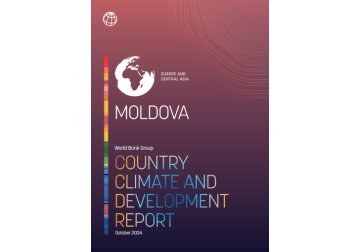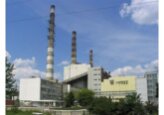
Effective climate action can help Moldova revive its economy, create jobs, and protect people from extreme weather events – WB
This is according to the Moldova Climate and Development Report (CCDR - Country Climate and Development Report), prepared by the World Bank Group. It notes that Moldova’s national development strategies already include many of the policies needed to create a prosperous, low-carbon, and resilient economy. But the country can go further to address persistent structural challenges, including weak economic growth and rising poverty, and accelerate integration with EU markets. “For Moldova, a small landlocked country on Europe’s doorstep, adopting an ambitious climate action agenda represents a significant opportunity to achieve its development goals,” said Inguna Dobraja, World Bank Group Country Manager for Moldova. According to her, the CCDR provides a comprehensive and actionable roadmap for the country to address climate challenges while promoting inclusive and sustainable economic growth. As the WB experts note, the price of inaction is high. Moldova is one of the most vulnerable countries in Europe in terms of energy, importing almost all of its coal, gas and oil products. It is also a carbon-intensive economy, with greenhouse gas (GHG) emissions per $1,000 of GDP six times higher than the EU average, putting the country at risk of EU carbon-related trade tariffs that come into force in 2026. It is emphasized that heavy dependence on drought-prone agriculture and exposure to natural shocks contribute to weak and unsustainable economic growth and increased rural poverty. Severe floods are becoming more frequent, droughts are becoming more frequent and severe, and air pollution is responsible for up to 3,000 deaths per year. Annual economic losses from multiple threats are estimated at about $164 million, equivalent to about 1.3% of GDP in 2021. A green transition is expected to bring significant benefits. This will help to revive and modernize Moldova’s economy, create better jobs, improve public health and minimize premature mortality from air pollution, and enhance energy security. The WB report emphasizes the need for a people-centered approach, focusing on people’s capabilities and well-being while protecting the most vulnerable and marginalized. Strengthening social protection, expanding access to modern and climate-resilient public infrastructure and services, and preparing people for the skills needed for a low-carbon economy which are essential to ensure that the workforce is prepared to support and benefit from climate action. The WB experts’ key recommendations include: improving energy security and efficiency, investing in adaptation, well-designed macro-financial policies to implement ambitious climate measures, and private sector participation. In particular, expanding the use of renewable energy and improving energy efficiency are vital to enhancing Moldova’s energy security and economic competitiveness. This will require significant investment and full implementation of reforms in the sector to integrate into the EU energy markets. To cope with the impacts of climate shocks and increase productivity in vulnerable sectors, significant investments in adaptation are needed, especially in Moldova’s agriculture sector, which is highly exposed to droughts and other climate threats. Risk financing solutions can help Moldova protect itself from disasters and increase financial resilience. The WB report highlights the need for well-designed macro-financial policies to implement ambitious climate measures. These policies will lay the foundation for sustainable and resilient growth by introducing carbon and pollutant taxes to encourage clean practices and generate revenues, prioritizing spending on modernizing and decarbonizing infrastructure and industry, and strengthening social protection. The bulk of climate finance is planned to come from the private sector. The report calls for increased public sector investment to create an enabling environment for private sector participation. It is emphasized that significant investments will be needed for a green transition. Over the next 30 years, Moldova will need about $31 billion to achieve the goals set out in the government’s action plan and another $8 billion to achieve net zero emissions. About two-thirds of the required investment should come from the private sector, especially in energy, industry and agriculture. To mobilize private investment, the report outlines three key approaches: enhancing investment attractiveness through policies that increase the financial returns on private sector projects; mobilizing state assets by facilitating private sector participation through public-private partnerships or privatization; and creating a supportive policy and regulatory framework for a green transition. With the support of multilateral development banks and the government, Moldovan banks are planned to issue green credit lines, bonds and loans. The World Bank Group’s Country Climate and Development Reports (CCDRs) are benchmark diagnostic reports that examine the relationship between climate change and development. They help countries prioritize the most effective actions that can advance the low-carbon transition and build resilience, while achieving broader development goals. Based on rigorous data and research, CCDR reports identify key pathways to reduce greenhouse gas emissions, their externalities and climate vulnerability, including costs and challenges, as well as benefits and opportunities. The reports propose concrete and priority actions to support the transition. As publicly available documents, CCDR reports aim to inform governments, citizens, the private sector, development partners and all stakeholders engaged in the development and climate agenda.// 30.01.2025 — InfoMarket







